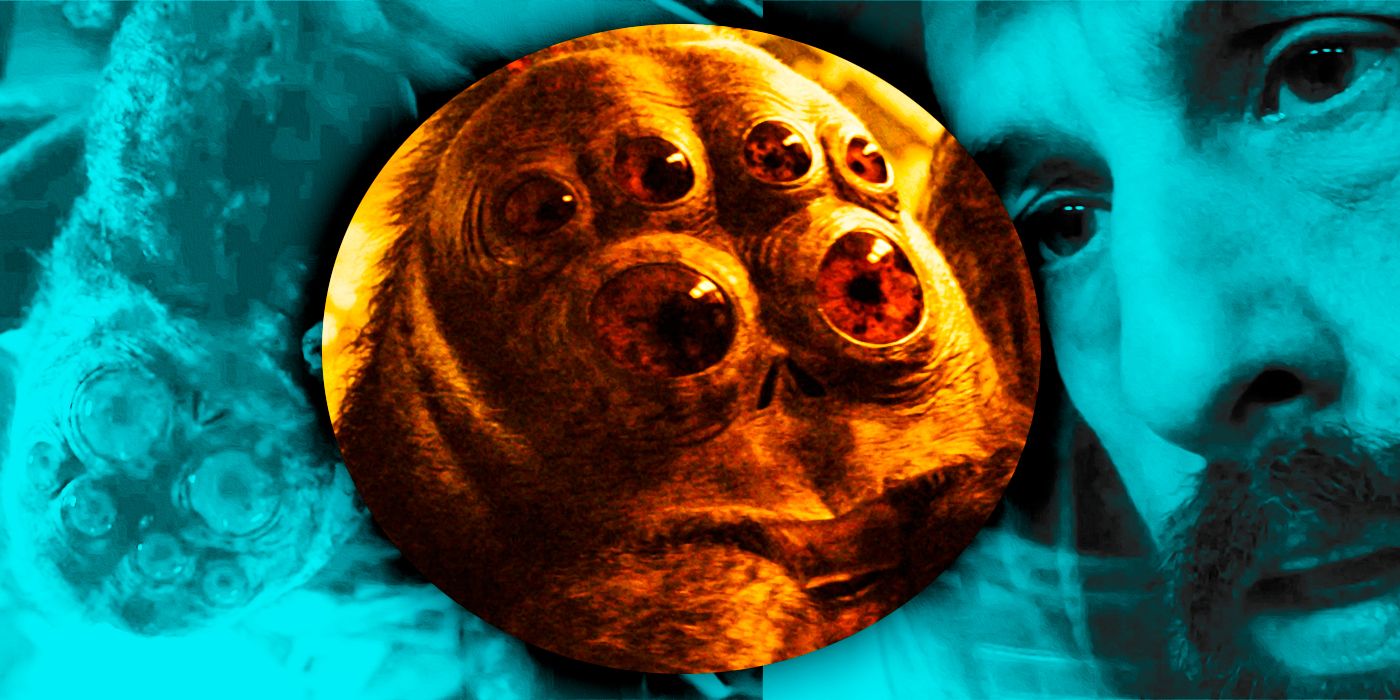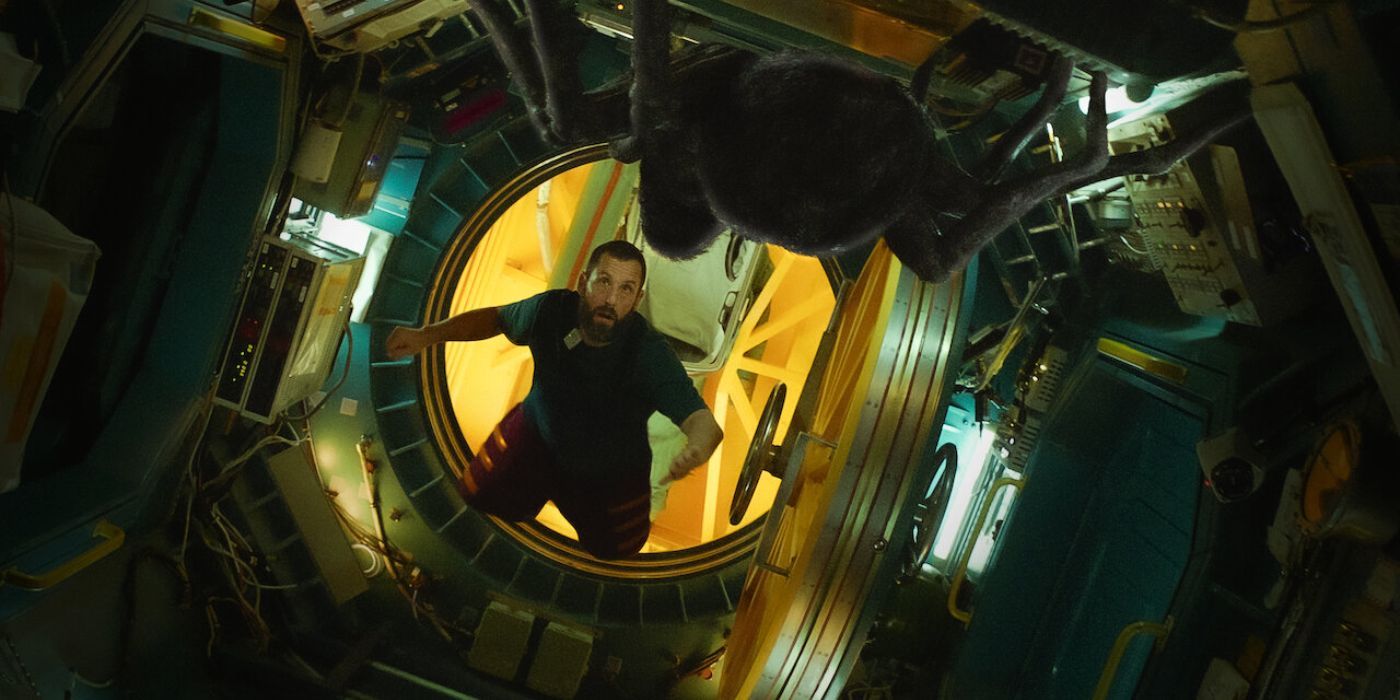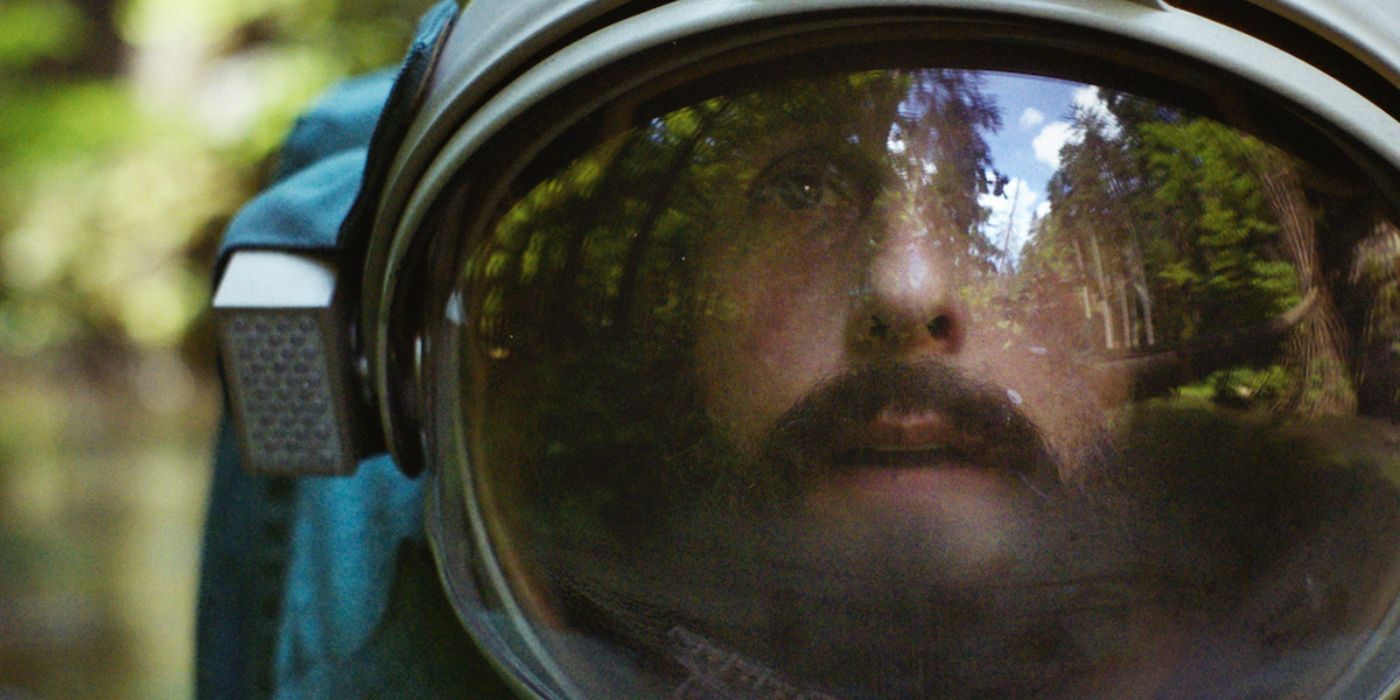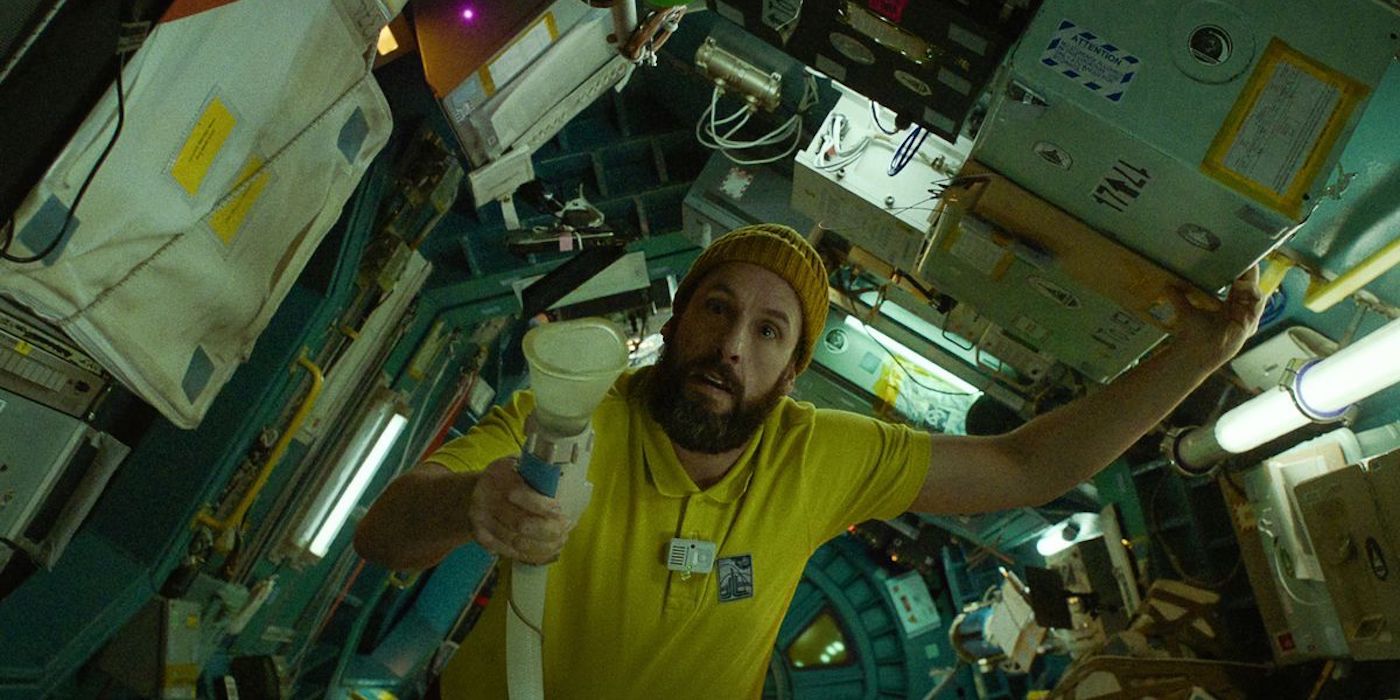
Netflix’s new movie is based on the 2017 novel “Spaceman of Bohemia” by Jaroslav Kalfař. The story follows comedian Adam Sandler in his role as Jakub Procházka, who is sent on a mission to gather samples from a mysterious purple cloud close to Jupiter called the Chopra Cloud. This is due to concerns that these cosmic particles might be harmful to Earth’s atmosphere.
Jakub’s voyage undergoes a psychological shift when he falls into depression, worrying about his marriage. This anxiety persists until he meets Hanuš, an enormous spider from another planet (whose voice is provided by Paul Dano). Hanuš assists Jakub in dealing with his problems, but the unsettling nature of this spider, even if it’s hard to believe it exists, leaves viewers questioning whether Hanuš is truly real by the end of the movie.
What Is Wrong With Spaceman’s Jakub Procházka?
And How Does an Extraterrestrial Spider Help?




After Carey Mulligan’s character Lenka, who won an Oscar, stopped communicating with him, Jakub finds himself emotionally exposed. Lenka believes that Jakub was thoughtless when he left her during her pregnancy, and her feelings of vulnerability are intensified by the fact that she had lost a child in the past. This loss makes Jakub incredibly sad, but he acknowledges that he deserves her anger. However, this doesn’t stop him from trying to reach out to her repeatedly on the phone.
Over time, Hanuš makes an appearance, initially causing fear in Jakub. However, what’s interesting is that Hanuš eventually establishes a connection with the cosmonaut by delving into his memories telepathically. This helps Hanuš understand Jakub’s past in the Czech Republic, including family hardships such as Jakub’s father being a communist spy, their home being burned down, and Jakub possibly attempting suicide. This troubling backstory adds an element of ambiguity to Jakub’s memories, making viewers question the truth behind his thoughts. Despite this, Jakub continues to nurture their relationship, becoming increasingly curious about why Hanuš seeks such a deep emotional bond with him.
Who Is Hanuš the Spider in Spaceman?
Does the Alien Offer Jakub Any Hope?
Hanus explains to Jakub that he is on a quest for knowledge, having fled the annihilation of his spider-like species by parasitic aliens known as Gorompeds. Travelling through the cosmos, he seeks answers about life’s origins and the universe’s truth, believing these secrets reside in the cloud. His initial interest was Earth and its inhabitants due to his ability to speak English, but he became captivated by Jakub’s ship and its troubled occupant. Now, Hanus desires to console Jakub and offer him companionship.
In simpler terms, Hanus is like a brother but their bond has had its ups and downs. Hanus uncovers audio recordings which reveal Jakub’s self-centered behavior towards his struggling marriage. The spider is taken aback, finding it hard to comprehend how someone could abandon their soulmate and disregard love. Hanus feels bitter, knowing he is showing the concern, kindness, and empathy that Jakub never extended to Lenka.
Is Jakub Hallucinating Hanuš in Spaceman?
The Spider May Be a Product of Jakub’s Guilt
In the movie titled “Spaceman,” the character Jakub expresses concerns about his psychological well-being. Despite not encountering a spectral entity, it’s plausible that spending time alone in space, battling insomnia and emotional turmoil, may have affected Jakub’s perception of reality. In his conversation with mission control in Europe, an assistant named Peter (portrayed by ) indicates he can’t find anything unusual on the surveillance footage. The ship’s instruments only detect Jakub as the sole life form aboard, and when Jakub requests a decontamination, it fails to remove Hanuš. This situation seems to imply that Hanuš is more of a product of Jakub’s imagination than a real entity. It’s possible that Jakub is subconsciously conjuring up the giant spider as a manifestation of guilt and self-hatred, with Hanuš serving as a reflection for him to ponder his wrongdoings.
It appears that Jakub, who has been absent for more than half a year, is experiencing a deceptive scenario tinged with remorse, which feels harsh to his ambitious nature. However, this illusion might be his mind’s method of dealing with his troubles. A significant hint arises when the spider confesses that he feels like a coward for leaving home, a sentiment Jakub is also experiencing. This suggests that Jakub, under mental probing, could simply be recalling his childhood and contemplating suicide due to neglecting Lenka in the present. He had pledged to vanquish the demons of his past by being with her, but he failed to recognize her affection. Moreover, the spider’s name suggests that perhaps a portion of Jakub’s consciousness is still connected to reality.
The illusion that Jakub, who has been away for over six months, finds himself in seems harsh due to his ambitious nature, but it might be his mind’s way of coping with its problems. A clear indication surfaces when the spider admits feeling like a coward for abandoning his home, an emotion that Jakub also experiences. This implies that Jakub, while under mental exploration, could just be reminiscing about his childhood and contemplating suicide because he neglected Lenka in the present. He had promised to exorcise the demons of his past by being with her, but he didn’t acknowledge her love. Furthermore, the spider’s name hints that a part of Jakub might still be grounded in reality.
Hanuš Is a Significant Name for Jakub
The Lonely Cosmonaut Knows What’s Real
Jakub decides to call his spider, Hanus, after a renowned clockmaker from a Czech legend. The tale recounts an astronomical clock erected in Prague during the 1400s known as the Orloj, which was rumored to monitor the celestial bodies. Many believed it was crafted by a man named Hanus, but it was discovered he was not the true artisan. As retribution, the Prague Councilors stripped him of his sight, and for over a century, no one could mend the clock. This mirrors the themes of self-sabotage and deception present in both Jakub and the spider from the novel “Spaceman“. Additionally, it suggests that, similar to historical Hanus, the spider might not be who he claims to be.
In a different wording: Jakub appears to be self-condemning; a man unaware of what he had before letting it slip away, and Adam Sandler’s portrayal of Jakub’s inner turmoil garnered critical acclaim. It seems plausible that Jakub may have meted out punishment to himself, unconsciously transforming his guilt into Hanuš. This is supported by the fact that Jakub used his desire for learning as a justification to flee, eventually recognizing his mistakes – something Hanuš also claims to have done. Since the spider escaped from its world, it has diverted attention and concentrated on other matters rather than focusing on self-healing, which hints at its similarity with the “small human” character.
Hanuš Becomes a Metaphor for Love and Genuine Connection
Jakub Finds This Connection Through the Spider
Regardless of reality, Hanuš symbolizes authentic bonding. As Jakub and Hanuš traverse the cosmic dust, the spider teaches him about love, as Jakub envisions the past, future, and potential family he could have shared with someone. Jakub recognizes the spiritual tie he shares with Lenka, while Hanus serves as the connection that anchors memories to a broader tapestry of recollections. Additionally, their shared fondness for hazelnut spread highlights the unique bond they share.
When Jakub kindly shares hazelnut spread with the spider in the cloud as a gesture of empathy, it symbolically reflects his desire to aid others while also finding solace himself. At this juncture, Hanuš perishes and is consumed by the lingering Gorompeds (potentially representing Jakub’s guilt – a burden he has been shouldering for years). Despite his demise, Hanuš experiences inner peace, marking a significant milestone in his own understanding that profoundly affects Jakub’s emotional odyssey.
Where Does Hanuš Death Leave Jakub and Lenka?
Lenka Has Also Been Part of Jakub’s Journey
Jakub’s mind travels to the river he dreaded upon learning about the spider’s demise, as it seems to symbolize his past with Lenka, who was dressed like a Rusalka, a Slavic folklore character resembling a water nymph. Reminiscent of his favorite folk tale, where a siren enchants a man and makes him love her despite the cost of his life, Hanuš’s passing appears to free Jakub from a hidden part of his mind – a memory that suggests the spider was intended to guide him back to his feelings for Lenka. This association is reinforced by the fact that she wore a nymph-like costume on their first date and they swore to explore new places together, swimming in a pool and sharing a kiss.
In a different phrasing, here’s how we can express it:
Jakub fails to keep his word, but the memory of that pledge lingers in him as a reminder not to let trivial matters overwhelm him. It’s high time for an open dialogue, similar to when he first met Lenka. Although Spaceman doesn’t clarify whether Hanuš is real or imaginary, one fact remains undeniable: Hanuš serves as a nagging question within Jakub’s mind, causing him to question his aspirations and rearrange his priorities. To move forward, Jakub must relinquish false expectations and confront reality—the loving family he left behind: Lenka and their unborn child.
What Did Paul Dano Think About Voicing Hanuš?
Renck Asked Dano Right Away If Hanuš Was Real
When queried about the authenticity of Hanuš, Paul Dano explained that this topic was one of the first things director Johan Renck raised when discussing the project. Dano said, “Firstly, I accepted everything in there as truthful because when Johan and I initially met, he asked me if I thought Hanuš was real. My response was, ‘Of course.’ I believe it’s impossible to portray a character who doesn’t exist. I found his small backstory intriguing – that his civilization has been lost, he’s traveled for thousands of years, and he himself is returning towards the beginning.
Speaking as a movie critic, I must say that upon embarking on this film, I found myself thinking, “I’m not sure if I’d revisit the start all by myself.” However, through the character of Jakub, Dano seems to unearth an emotion we call love. Each figure in this narrative is unique, and each scene offers a distinct piece that, in my opinion, should guide you as the story unfolds. Indeed, one must nurture their own life within the context of the tale. Interestingly, it was intriguing to learn that Renck questioned Dano about his perspective on the film’s supernatural aspects, given that Renck himself later proved surprisingly candid regarding his stance on the subject.
Director Johan Renck Has a Definitive Position on Hanuš
Creators Don’t Have a Final Say, Though
Contrary to what might be expected given Hanus’s complex character in the film “Spaceman,” director Johan Renck chose a different route in portraying Hanus’s reality. Rather than fostering ambiguity, as one might assume, Renck declared, “No, he’s one-hundred-percent real.” He emphasized that the film is not like David Cronenberg’s “Naked Lunch” or Kafkaesque, and that Hanus’s non-reality would render the entire movie meaningless. Renck further explained his intent to avoid making Hanus seem mundane, instead portraying him as an altruistic creature who could help Jakub overcome his challenges.
While it’s worth noting that Renck’s personal interpretation doesn’t dictate how viewers perceive things, the original creator’s intent can be intriguing, but it doesn’t set the absolute truth. If you examine a piece and your interpretation aligns with evidence, it doesn’t make you incorrect if the author expresses a different intention later. Once the work is released, it becomes the property of its audience, and while the creator’s insights about their work are always valuable, they don’t control the meaning of the work, only their intentions behind it. So, Renck’s perspective is valid, but it doesn’t establish the truth; it merely offers his understanding of the subject matter.
In the Final Analysis of Spaceman, Is Hanuš Real?
Either Way, the Spider Has a Real Purpose
Hanuš doesn’t necessarily need to be a figment of Jakub’s imagination for him to symbolize the struggles Jakub is dealing with and serve as a means for him to overcome those difficulties. Science fiction often does this, exploring the psychological aspects of characters by making their experiences reflect their inner conflicts. It’s a common trope in classic science fiction stories, where strange situations can represent the challenges or dilemmas the characters are facing.
Hanuš doesn’t have to be real for him to symbolize Jakub’s struggles and help him find solutions. Many science fiction works use this technique, representing characters’ conflicts through unusual situations, which is a common approach in classic science fiction stories to tackle bizarre scenarios.
Lastly:
Hanuš doesn’t need to be real for him to represent Jakub’s struggles and help him find answers. In many science fiction works, authors use this method to explore characters’ inner conflicts by depicting their experiences as symbolic representations of their challenges or dilemmas. This approach is often used in classic science fiction stories when dealing with strange or bizarre situations.
If Hanuš, the Space Explorer as depicted by Spaceman, truly exists, it opens up a fascinating possibility: there could be beings out there who prefer to aid troubled people rather than conquer worlds. This idea is equally intriguing, if not more so, compared to the concept of a psychological manifestation. However, Renck’s suggestion about multiple Hanušs isn’t a new trope. In fiction, alien spiders have traditionally been portrayed in various narratives, often playing complex roles with humans, mostly as villains but sometimes in intriguing ways too.
Hanuš Subverts the Alien Spiders in Other Fiction
Most Alien Spiders Are Malevolent
In many stories, spiders are portrayed as symbols of evil or malicious entities. J.R.R. Tolkien contributed to this stereotype by making all his spiders in his vast mythology into monstrous antagonists. This trend was further reinforced in pulp sci-fi novels and short stories, with numerous magazines featuring spider-like alien villains. Given that arachnophobia is one of the most common human fears, it’s easy to see why spiders are often perceived as the offspring of the devil. However, Spaceman‘s Hanuš challenges this overused trope by presenting spiders as beings of kindness instead.
As a passionate movie critic, I must say that the most chilling extraterrestrial arachnid has to be none other than the shape-shifting entity disguised as… Pennywise, the clown from IT. Belonging to the elusive Deadlights race, this fiendish being feigns friendliness to ensnare innocent children, ultimately transforming into a colossal spider before meeting its untimely end at the hands of the brave heroes.
In a similar vein, the Alien Spiders in Arachnid are relentless killers, using their menacing claws and legs to pierce through defenseless victims. And let’s not forget Greta in Love, Death, and Robots’ “Aquila Rift,” whose spider form embodies the sheer terror of the infinite cosmos and the fine line between deception and reality.
Across the spectrum, we find Hanuš, whose appearance is indeed fearsome. Yet, “Spaceman” compels its audience to recognize that even such a formidable creature can be gentle and caring, provided Hanus is a genuine entity rather than a manifestation of Jakub’s distress. Meanwhile, Hanuš is not the sole kind-hearted spider in literature; figures like Charlotte and Anansi are also benevolent. However, Hanuš’s function within “Spaceman” purposefully seeks to overturn the archetype of wicked spiders, thereby making him an extraordinary character.
Read More
- Clash Royale Best Boss Bandit Champion decks
- Vampire’s Fall 2 redeem codes and how to use them (June 2025)
- Mobile Legends January 2026 Leaks: Upcoming new skins, heroes, events and more
- World Eternal Online promo codes and how to use them (September 2025)
- How to find the Roaming Oak Tree in Heartopia
- Best Arena 9 Decks in Clast Royale
- Clash Royale Furnace Evolution best decks guide
- Clash Royale Season 79 “Fire and Ice” January 2026 Update and Balance Changes
- Clash Royale Witch Evolution best decks guide
- Best Hero Card Decks in Clash Royale
2025-05-01 20:53